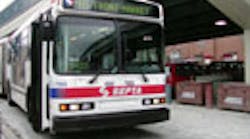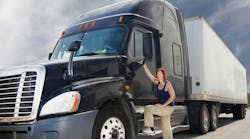Mass transit systems – especially bus networks – are increasingly being viewed not only as the best method for reducing urban traffic congestion but also for cutting air pollution levels, resulting in economic benefits for cities and states.
For example, a recent study commissioned by Chicago Metropolis 2020 (a business-based civic organization) called “Time Is Money: The Economic Benefits of Transit Investment,” found that the $1.68 billion minimum annual investment needed to maintain Chicago’s current mass transit systems would result in at least a 21% return on investment for the region's economy – primarily from less traffic congestion.
“[It’s] a classic case of ‘pay me now or pay me more later’ where the benefits of paying now far outweigh the damage that would be caused by failure to invest in transit,” said George Ranney, Jr., president & CEO of Chicago Metropolis 2020. “By paying now, the economy is strengthened and jobs are created. And the payment is returned in the form of measurable economic benefits.”
Forgoing that investment, however, would result in “job losses, more crowded highways, slower mass transit and a region that will no longer be such an attractive place to raise a family and run a business,” Ranney said. More traffic congestion alone would cost the regional economy surrounding Chicago more than $2 billion per year, he added.
The study also found that if the Regional Transportation Authority (RTA) boosted mass transit funding to $2.4 billion a year, it would return as much as $3.86 billion in measurable yearly benefits for the six-county region around Chicago – a 61% annual return on investment, Ranney said.
“This research shows … even greater returns would come from higher spending on carefully planned expansion,” he noted. “Transit-oriented development should be the rule, not the exception, and higher gas taxes and value pricing for expressway drivers would have the twin benefits of providing a reliable funding source and improving transportation efficiency in the region.”
Transit agencies are also finding that wider use of low-pollution buses – such as diesel-electric hybrid models – can substantially cut vehicle pollution while conserving fuel at the same time.
Those two reasons are why the Southeastern Pennsylvania Transportation Authority (SEPTA), which runs Philadelphia’s transit systems, plans to buy 400 new 40-foot diesel-electric hybrid buses from New Flyer of America for over $212 million, adding to the 32 diesel-electric hybrid units it already operates.
“It’s a significant step in our efforts to build and maintain one of the greenest, most energy-efficient large-city public transportation systems in the nation,” said SEPTA general manager Faye Moore. “Public transit is already the greenest option available for daily riders traveling to work, school and recreational activities … so they can leave their cars at home. Hybrid-diesel buses allow us to be even more energy-efficient and environmentally conscious.”
SEPTA plans to introduce the new hybrid buses into its bus fleet starting in March, replacing existing buses that have reached the end of their 12-year life cycle. SEPTA said the key benefit to these buses are significantly reduced engine exhaust emissions and increase of fuel economy. Hybrid buses on average are 29% more fuel efficient than normal diesel buses and can reduce carbon monoxide and carbon dioxide emissions by 80% and 38% respectively, according to SEPTA research.




